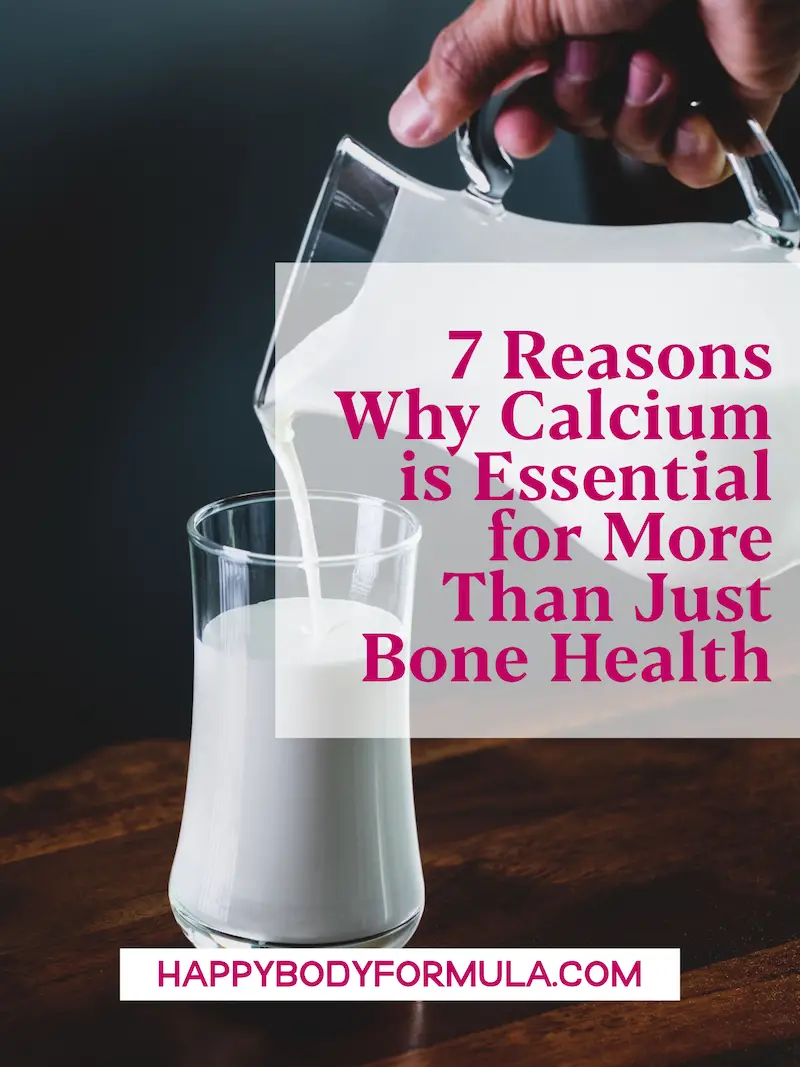
Calcium is well-known for its role in bone health—it’s shouted from commercials, advertisements, and most doctor offices. Everyone needs calcium for healthy bones.
Yet calcium supplements are essential for many other health reasons, much like other nutrients are also critical for bone wellness (like magnesium and vitamin D, to name a few).
[toc]
What is Calcium?
Calcium is an essential mineral and the most abundant mineral in the human body. It is required for many aspects of health, including:
- Bone strength and skeletal structure
- Normal heart rhythm
- Muscular function
- Healthy blood pressure
- Normal cholesterol levels
- Nerve communication and signaling
- Balance of minerals magnesium, phosphorous, and potassium in the blood
- And more
A deficiency in calcium isn’t only harmful for bones, but it’s detrimental for heart heart, the nervous system, the muscular system, and beyond.
While it’s true that most of the body’s calcium stores are held in the bones and teeth (approximately 99 percent of it), it’s still needed for other reasons. The other one percent of calcium lives in various tissues throughout the body. (source)
Calcium is needed on a daily basis from dietary sources. The recommended daily amount for adult men and women under age 50 is 1,000 milligrams, and over age 50 increases to 1,200 milligrams.
Children need between 200 and 700 milligrams daily, depending on age, and teenagers need 1,300 milligrams daily to support the rapid growth and expansion of the skeletal frame in the teen years.
Low levels of calcium at any age can lead to serious problems. Signs of low calcium can include:
- Bones that fracture easily
- Osteoporosis diagnosis
- Osteopenia diagnosis
- Blood clotting abnormalities
- Muscle spasms or cramps
- Poor growth and development in children and teens
- Blood pressure problems or heart arrhythmias
- Poor energy levels and fatigue
The body works hard to keep calcium levels stable at all times, so when it’s low in tissues, it can pull calcium from bone stores. The problem is that, over time, this results in the bones being deficient in this crucial nutrient.
At some point in the aging process, it can be difficult to recoup these losses. Bone density begins to naturally decline in the 30s and rapidly progresses after menopause sets in for women, and after age 50 for men.
Certain people have a higher risk for calcium deficiency than others. Risk factors can include:
- Children and adolescents who are experiencing rapid times of growth and development
- Pregnant women
- Postmenopausal women
- Diets high in grains, beans, and legumes
- Diets excessively high in protein or sodium
- Long-term use of steroids
- People who don’t eat any dairy products
- People with insufficient or deficient vitamin D levels
- People who have digestive problems that make it hard to absorb nutrients from food
Even though calcium is found in many food sources, many adults in the United States and across the world do not get enough each day to maintain healthy bone and tissue levels.
While this affects both men and women, women are at greater risk from long-term lower levels.
7 Health Benefits of Calcium
While bone health is a crucial aspect of calcium, it is far from the only reason that we need it. These are the top reasons why the body needs calcium.
1. Healthy Bones and Teeth
Calcium is needed for the growth and health of the entire skeletal structure. The same is true for teeth.
Calcium works with other nutrients, like magnesium, vitamin K, vitamin D, and phosphorous, to provide strong bones that support the weight of the body. Without enough calcium, bones will be weak and brittle and prone to easy breaks.
Calcium also helps to prevent tooth decay and promotes healthy teeth and gums.
2. Healthy Blood Pressure Levels
Calcium is a mineral that is crucial for helping to regulate heart functions. This is because it helps to dilate blood vessels, allowing blood to pass more freely through them, and reducing the likelihood that arterial plaque will build up.
Calcium also helps to send chemical nerve signals from the brain to the heart, which promotes normal heart rhythms, blood pressure, and healthy systemic circulation.
Ensuring that calcium levels are adequate has been shown by research to help lower blood pressure in people who were diagnosed with hypertension. (source)
Boosting calcium levels by using supplements as needed has further supported the role that calcium has in reducing blood pressure levels.
3. Healthy Glucose Levels
Calcium isn’t only important for bone health, it also supports glucose metabolism and how the body handles the digestion of carbohydrates. It can even be helpful in preventing diabetes, according to research. (source)
This is because calcium, along with vitamin D, acts on cells in the pancreas that regulate how much insulin is made and released. The amount of insulin released determines how much blood sugar is taken into cells versus how much remains in circulation.
Regular intake of calcium at the RDA or higher (1,200 milligrams) was associated with a more than 30 percent reduced risk of developing type 2 diabetes. (source)
While there are other factors in preventing diabetes, this research shows that calcium is critical for other aspects of health that go beyond bone strength alone.
It’s also possible to assume that those who eat nutrient-rich diets, including those with adequate calcium, are also doing other things to reduce the risk of diabetes. Either way, optimal levels of calcium are required in both scenarios.
4. Reduced Risk for Certain Types of Cancer
Cancer prevention is a popular topic and for good reason—it’s often easier to prevent something than to cure it.
Research shows a strong association between healthy calcium levels, paired with good vitamin D intake, and a reduced risk of developing 15 different types of cancer, including: (source)
- Colon cancer
- Rectal cancer
- Gastric cancer
- Breast cancer
- Endometrial cancer
- Ovarian cancer
- Renal (kidney) cancer
Research shows a strong association between optimal levels of calcium and a reduced chance of developing these types.
Calcium could have anti-cancer properties due to the way that it induces cell death in cancerous cells and the checks and balances it introduces for cell reproduction. (source)
However, simply supplementing with high levels of calcium don’t provide anti-cancer benefits. Calcium needs to be obtained naturally through dietary sources to primarily have the overall health benefits.
5. Healthy Muscles and Nerves
Calcium is necessary for the release of certain neurotransmitters in the brain that help to regulate muscle movements and contractions, as well as nerve signaling.
It helps cells communicate better, relay nerve impulses, and activate proteins in the body that control voluntary and involuntary movement. (source)
Calcium is also essential for helping to maintain healthy glucose levels. This is important because the muscles draw from glucose stores to get fuel for the energy needed to move.
Without adequate calcium levels, this process can be compromised, and the results could be muscle spasms and cramps, fatigue, and poor nerve function.
6. Supports Healthy Body Weight
Everyone seems to be looking for the magic bullet to fight obesity and promote healthy, natural weight loss.
While nothing is a quick or magic fix, healthy calcium levels are associated with maintaining healthy body weight in both men and women.
Low calcium levels contribute to weight problems by triggering excess parathyroid hormone to be released. This causes the body to withdraw more calcium from bone stores.
However, excess parathyroid also triggers the production and storage of fat, preventing its breakdown, and contributing to excess body weight.
7. Supports Kidney Health
Kidneys filter fluids in the body and get rid of waste. Because of this, they can be at risk for developing stones of oxalate deposits as waste passes through.
In the past, it was assumed that high levels of mineral intake was what caused these to occur, but more modern research shows that optimal intake levels of calcium actually decrease the risk of developing kidney stones, along with drinking plenty of fluids and maintaining healthy hydration levels.
Bottom Line
Calcium is a vital nutrient that supports skeletal health. While 99 percent of calcium stores live in the body’s bones and teeth, the other one percent that is found in tissues is vital for health and wellness.
While calcium is essential for health, how you get it matters equally as much. Those who have low dietary calcium intake might be tempted to simply get all of their calcium from supplements alone, but the absorption rate and other nutrient balance does not make this an equal choice.
In fact, research finds that excessive supplementation from calcium without a high level from foods can result in an increased risk for heart attack. (source)
The Best Dairy-Free Foods That Are Rich In Calcium
We all know that dairy products are high in calcium, but many adults and children can’t digest dairy. You can still get plenty of dietary calcium from non-dairy food sources.
Dairy-free foods that are naturally high in calcium include:
- Bone-in sardines (1 cup = 57 percent RDA)
- Almonds (¼ cup = 14 percent RDA)
- Raw kale (1 cup = 9 percent RDA)
- Raw okra (1 cup = 8 percent RDA)
- Bok choy (1 cup = 7 percent RDA)
- Broccoli (1 cup = 5 percent RDA)
- Watercress (1 cup = 4 percent RDA)
While calcium foods contain some of the highest amounts of calcium per serving, sardines are actually higher than milk or cheese. Research shows that calcium from dairy sources is not superior, as many in the past have claimed.
It is especially not effective for people who struggle to digest lactose or who are allergic to milk protein to assume that they need dairy products to have healthy calcium levels.
Whether you eat dairy products or not, getting calcium from food sources is optimal. If it is not possible to get enough calcium from food alone, supplements may be used, but it is not healthy to rely only on supplements, and can, in fact, be risky or disruptive to overall mineral balances.
How to Supplement with Calcium
If you do need to up the amount of calcium in your diet and plan to use a supplement, be sure that you approach it as a supplement and that you are not aiming to get all 1,000 milligrams or more from a capsule alone.
Additionally, the calcium-filled antacids are not the optimal form of calcium and can also reduce stomach acid too much, compromising digestion and making it harder for the body to absorb nutrients in general.
If you plan to supplement with calcium, be sure to check with your doctor first and ask if it’s recommended. Second, ask the maximum number of milligrams you should take each day from supplements.
If you take a multivitamin, check the number of milligrams in that first. Next, choose a high-quality supplement that contains no additional ingredients.
It’s also a good idea to pair calcium with vitamin D supplementation if needed.
Share on Pinterest

Aimee McNew, MNT, CNTP, is a certified nutritionist who specializes in women’s health, thyroid problems, infertility, and digestive wellness. She ate her way back to health using a Paleo diet, lost 80 pounds, and had a healthy baby after numerous miscarriages. She focuses on simple nutrition practices that promote long-lasting results.

